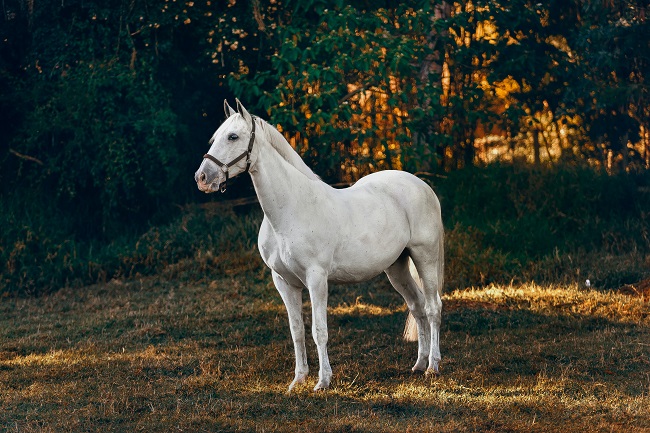When your horse has severe muscle cramping known as tying up, do your best to keep him still and comfortable while you wait for the veterinarian. Immediately allow you horse to stand exactly where he stopped. He can’t “walk out of” these muscle cramps. In fact, making him move would only compound the damage to his muscles. Your veterinarian will advise you how to move him if it’s necessary. Immediately warm or cool the affected muscles, depending on the season. If you horse ties up in cold weather, throw a blanket over his hindquarters to help ease the cramping. Likewise, if the episode occurs in hot conditions, sponge the cramped muscles with cold water. And don’t worry: Contrary to popular belief, there is no evidence that applying cold water to hot muscles causes or worsens cramping.

White hairs will appear at pressure points of your saddle when pressure damages a hair follicle. A normal colored hair may fall out and be replaced by a white hair. The sudden appearance of white hairs calls for an evaluation of how your horse’s tack and/or blankets fit. Pressure intense enough to cause white hair will also cause pain and possibly lasting nerve damage in that area.
A rough idea of how tall your foal or young horse will be, can be determined by a long length of string. Holding one end of the string against the ground, stretch it up taunt to the horse’s elbow. That length is approximately the same distance the horse will be from elbow to withers when mature.
A leisurely stroll with a horse that has been confined to their stall, paddock or recuperating from an illness or injury can be extremely beneficial. They can benefit from the fresh air, exercise, and mental stimulation of a calm walk in-hand.
Never medicate an eye with leftover or borrowed ointments without first consulting your veterinarian. Using the wrong product for a particular eye condition can have detrimental effects. Medicating an injured eye with a steroid ointment instead of an antibiotic, for instance, can lead to a severe fungal infection.
Related Articles & Free Email Newsletter Sign Up
4 Inexpensive and Easy Horse Care Ideas
How to Prevent Horse Respiratory & Skin Problems During Winter


Comment here